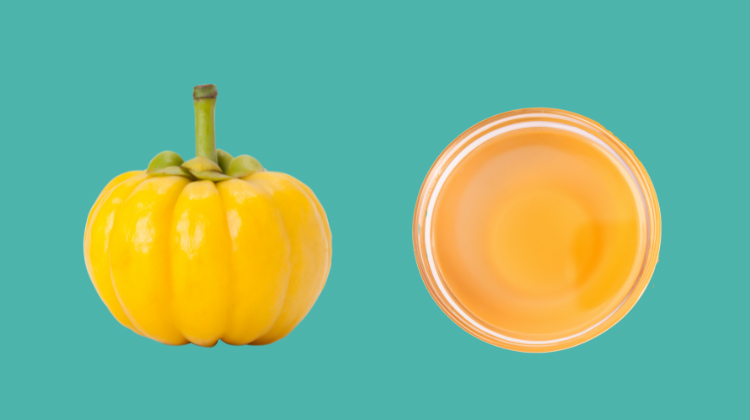 Expert's opinion
Expert's opinion
Expert's opinion
The article is a subjective view on this topic written by writers specializing in medical writing.
It may reflect on a personal journey surrounding struggles with an illness or medical condition, involve product comparisons, diet considerations, or other health-related opinions.
Although the view is entirely that of the writer, it is based on academic experiences and scientific research they have conducted; it is fact-checked by a team of degreed medical experts, and validated by sources attached to the article.
The numbers in parenthesis (1,2,3) will take you to clickable links to related scientific papers.
Should You Use Apple Cider Vinegar & Garcinia Cambogia Together 2024?

Look, when it comes to our waistlines, we’re willing to try everything. Exercise? Done. A healthy meal? You got it. Diet pills? Well…what’s in them?
One of the most talked-about weight loss ingredients includes garcinia Cambogia extract, derived from a tropical fruit called garcinia gummi-gutta. Some believe that taking garcinia Cambogia in combination with apple cider vinegar might be able to boost your weight loss efforts, but the effectiveness of this stuff is contested by many.
You’ll find garcinia Cambogia in capsules, pills, foods, and drinks. Should it become a regular part of your routine, though? We think not—in fact, it’s actually the active ingredient in several dangerous weight loss supplements publicly vilified[1] by the Food and Drug Administration (FDA).
While it hasn’t necessarily been outlawed for personal use, this tropical fruit extract might be more fraudulent than anything else. Here’s what you should know before trying it out yourself.
Should We Take Garcinia Cambogia & Apple Cider Vinegar Together?
In short: it does not appear to be so. These are two different weight-loss remedies celebrated in the public eye, both with individual properties that some believe may help a person lose weight.
Few formal studies exist that analyze how they interact uniquely with one another in the body—at some point in time, somebody decided to try them together, and other colloquial, self-reported results have consequently followed. Some love it. Some hate it. Will we ever really know the truth?
The combination of HCA and acetic acid seems to be what compels most to mix the two together. On their own, the secondary effects of both of these simple compounds have been studied with wildly varying outcomes, as shown above. For this reason, we can’t recommend them together for weight loss, at least not without the advice of your own physician.
What Is Garcinia Cambogia?
Garcinia cambogia extract is a chemical compound derived from one of several plants[2] hailing from southeast Asia, such as Garcinia Cambogia, Garcinia Indica, Hibiscus Subdariffa, and Garcinia Atroviridis. Its scientific name is Hydroxycitric Acid (HCA) and is derived from the citric acid found in these plants.
Hydroxycitric acid is the active ingredient that is most recognized as the active ingredient in Garcinia Cambogia dietary supplements. How can take Hydroxycitric acid-rich Garcinia Cambogia to help you lose weight?
There are many theories, and none of them have been proven definitively—some believe that this compound inhibits[3] adenosine triphosphatase-citrate-lyase, resulting in a loss of body weight and the disruption of fat synthesis, as well as the inhibition of pancreatic alpha-amylase and intestinal alpha glucosidase[4]. Other takes include the notion that taking garcinia Cambogia actually causes the brain to produce serotonin in excess[5], which may suppress the appetite and result in weight loss and other health benefits.
You’ll find tons of personal accounts online about how Garcinia Cambogia was able to help this person or that person lose weight. When put to the ultimate test, however, it only appears to make the grade when the trial itself has been sponsored by the branded supplement containing the compound. So it goes.
What Is The Proper Dosage Of Garcinia Cambogia?
We should preface this section with the caveat that you shouldn’t use dietary supplements that have not yet been proven to be safe for human consumption.
With that being said, many of the clinical studies that we found on the topic indicated trial doses from anywhere between 1 g to 2.8 g of Garcinia Cambogia daily.
To reiterate: there really is no “optimal” dose to take when it comes to Garcinia Cambogia, at least not according to the FDA. While this supplement is unlikely to kill you when taken in moderation, using too much Garcinia Cambogia may result in any of a number of negative side effects, users beware.
What Is Apple Cider Vinegar?
Apple cider vinegar is much, much more common in the western world. This supplement is made by fermenting apple cider and is usually sold by the bottle with a cultured mother resting at the bottom.
It’s full of antioxidants, polyphenols, and other bioactive compounds. This prebiotics are often attributed to many of the digestive benefits of drinking apple cider vinegar medicinally in the morning and might be able to improve your gut health.
Apple cider vinegar has been shown to be moderately effective[6] in animals as a weight loss aid, and may help ordinary people control their blood glucose, visceral fat area, waist circumference, and serum triglyceride levels naturally and without harmful and intrusive medication. Not only that, but the acetic acid in it may also be able to help you suppress[7] your appetite and resist food cravings, as well, saving you calories later on.
Apple Cider Vinegar and Garcinia Cambogia Side Effects
Is this tropical fruit extract dangerous? Not really, but it has been shown to cause some problems that might outweigh the health benefits that it brings to the table, including, perhaps, enhanced weight loss.
Should you be worried? Maybe. Some of the most common side effects of taking Garcinia Cambogia for weight loss may include:
- Headache
- Rashes and other skin irritation
- Cold-like symptoms
- Gastrointestinal dysfunction
- Nausea
- Abdominal pain
- Dark urine
- In the most extreme cases[8], liver problems
This last side effect comes to us primarily from one of the most concerning studies[9] on garcinia Cambogia—this study showed us how six weeks of garcinia Cambogia use resulted in one man succumbing to advanced liver damage, jaundice, and all. Silly names like “Super Ananas Slim” aside, these over-the-counter weight loss “fat-busters” should be avoided at all costs.
Again, Garcinia Cambogia is not a banned substance as far as the FDA is concerned. Studies like the one mentioned above, however, serve as a chilling warning—even all-natural supplements and extracts may cause us extraordinary bodily harm if taken to the extreme. Is weight loss worth it? Perhaps, but there are so many safer ways to meet your weight loss goals.
And, as for the rest of the equation? Apple cider vinegar on its own is harmless enough, although it is potent enough to cause a myriad of potential health problems:
- Low potassium[10]
- Low blood sugar
- Chemical burns[11] on the skin, esophagus, and eyes
- Erosion to tooth enamel
Diluting apple cider vinegar greatly and only taking it in moderation is all that you need to do if you would like to avoid these negative side effects. One or two tablespoons diluted in about a cup of filtered water is a safe dose for any non-diabetic—if you do have diabetes, please consult your doctor before subscribing to this daily vinegar ritual.
Final Thought: Do They Help You Lose Weight?
The truth? You’ll find tons of popular studies and health articles speaking to the merit of this combination, but don’t be fooled. While statistical data of success in the short term is often at the forefront of these claims, its lasting ability to promote a sustainably healthy weight appears to be dubious at best.
Can you take either of these natural supplements as part of your healthy diet? Absolutely. Are they the miracle solution that they claim to be?
Probably not. Eat healthy, exercise, and live a happy, active, and exciting life; when you’re able to find balance through positive personal choices, you’ll lose weight naturally, with no weight loss supplement required.
+ 11 sources
Health Canal avoids using tertiary references. We have strict sourcing guidelines and rely on peer-reviewed studies, academic researches from medical associations and institutions. To ensure the accuracy of articles in Health Canal, you can read more about the editorial process here
- Office (2022). Health Fraud Product Database. [online] U.S. Food and Drug Administration. Available at: https://www.fda.gov/consumers/health-fraud-scams/health-fraud-product-database.
- Onakpoya, I., Hung, S.K., Perry, R., Wider, B. and Ernst, E. (2011). The Use of Garcinia Extract (Hydroxycitric Acid) as a Weight loss Supplement: A Systematic Review and Meta-Analysis of Randomised Clinical Trials. Journal of Obesity, [online] 2011, pp.1–9. Available at: https://www.ncbi.nlm.nih.gov/pmc/articles/PMC3010674/.
- Preuss, H.G., Bagchi, D., Bagchi, M., Rao, C.V.S., Dey, D.K. and Satyanarayana, S. (2004). Effects of a natural extract of (-)-hydroxycitric acid (HCA-SX) and a combination of HCA-SX plus niacin-bound chromium and Gymnema sylvestre extract on weight loss. Diabetes, Obesity and Metabolism, [online] 6(3), pp.171–180. Available at: https://pubmed.ncbi.nlm.nih.gov/15056124/.
- Yamada, T., Hida, H. and Yamada, Y. (2007). Chemistry, physiological properties, and microbial production of hydroxycitric acid. Applied Microbiology and Biotechnology, [online] 75(5), pp.977–982. Available at: https://pubmed.ncbi.nlm.nih.gov/17476502/.
- Toromanyan, E., Aslanyan, G., Amroyan, E., Gabrielyan, E. and Panossian, A. (2007). Efficacy of Slim339® in reducing body weight of overweight and obese human subjects. Phytotherapy Research, [online] 21(12), pp.1177–1181. Available at: https://pubmed.ncbi.nlm.nih.gov/17639559/.
- KONDO, T., KISHI, M., FUSHIMI, T., UGAJIN, S. and KAGA, T. (2009). Vinegar Intake Reduces Body Weight, Body Fat Mass, and Serum Triglyceride Levels in Obese Japanese Subjects. Bioscience, Biotechnology, and Biochemistry, [online] 73(8), pp.1837–1843. Available at: https://pubmed.ncbi.nlm.nih.gov/19661687/.
- Frost, G., Sleeth, M.L., Sahuri-Arisoylu, M., Lizarbe, B., Cerdan, S., Brody, L., Anastasovska, J., Ghourab, S., Hankir, M., Zhang, S., Carling, D., Swann, J.R., Gibson, G., Viardot, A., Morrison, D., Louise Thomas, E. and Bell, J.D. (2014). The short-chain fatty acid acetate reduces appetite via a central homeostatic mechanism. Nature Communications, [online] 5(1). Available at: https://pubmed.ncbi.nlm.nih.gov/24781306/.
- Nih.gov. (2019). Garcinia Cambogia. [online] Available at: https://www.ncbi.nlm.nih.gov/books/NBK548087/.
- Lunsford, K.E., Bodzin, A.S., Reino, D.C., Wang, H.L. and Busuttil, R.W. (2016). Dangerous dietary supplements: Garcinia cambogia-associated hepatic failure requiring transplantation. World Journal of Gastroenterology, [online] 22(45), p.10071. Available at: https://www.ncbi.nlm.nih.gov/pmc/articles/PMC5143754/.
- Lhotta, K., Höfle, G., Gasser, R. and Finkenstedt, G. (1998). Hypokalemia, Hyperreninemia and Osteoporosis in a Patient Ingesting Large Amounts of Cider Vinegar. Nephron, [online] 80(2), pp.242–243. Available at: https://pubmed.ncbi.nlm.nih.gov/9736833/.
- Feldstein, S., Afshar, M. and Krakowski, A.C. (2015). Chemical Burn from Vinegar Following an Internet-based Protocol for Self-removal of Nevi. The Journal of clinical and aesthetic dermatology, [online] 8(6), p.50. Available at: https://www.ncbi.nlm.nih.gov/pmc/articles/PMC4479370/.



